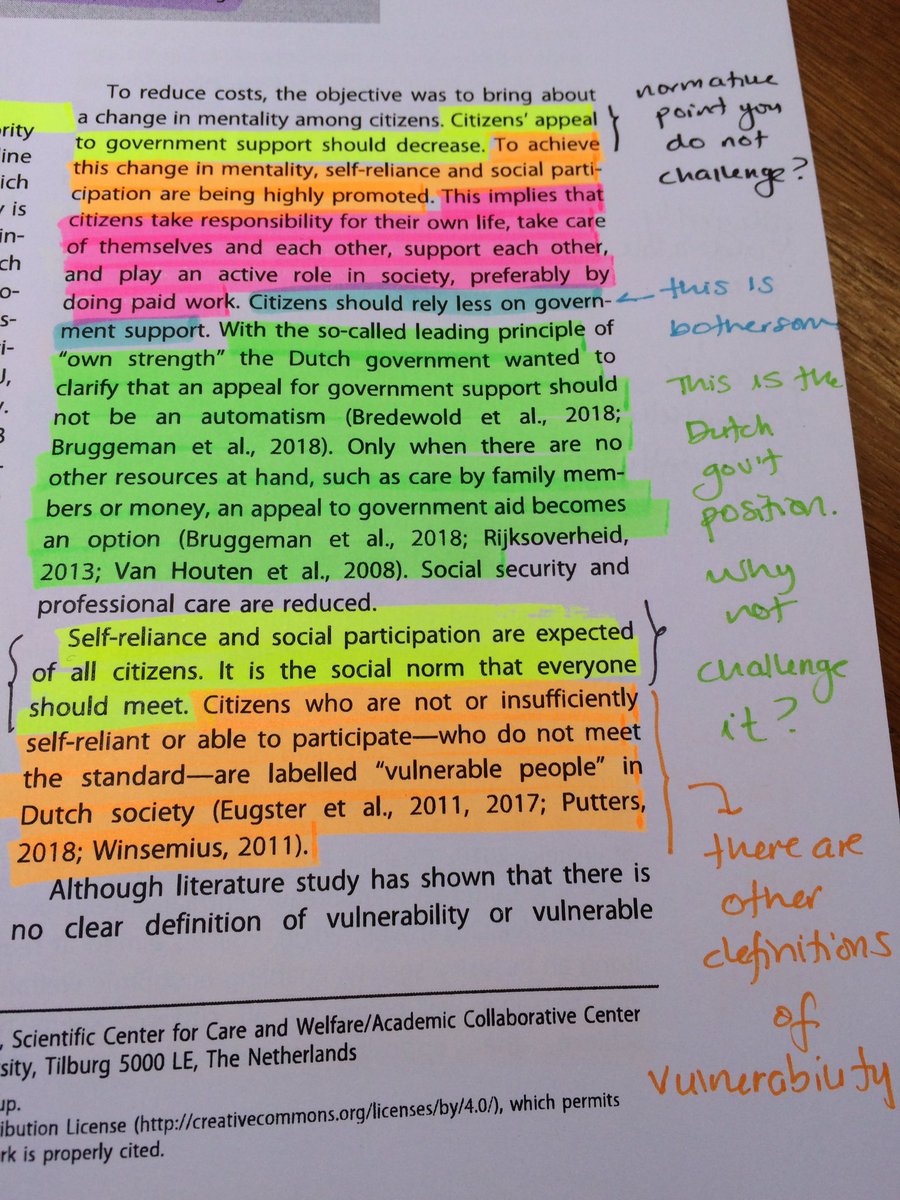
En la charla que dí en el seminario #SIGMAS organizado por estudiantes de mi querido @I_Solorio me hicieron la pregunta que más frecuentemente me hacen cuando doy clases de métodos, talleres, o charlas.
"Profesor, cómo le hago para empezar a escribir, me siento bloqueado/a"
"Profesor, cómo le hago para empezar a escribir, me siento bloqueado/a"
Hoy en la mañana se me ocurrieron 3 sugerencias sencillas para todo nivel de pre-grado y posgrado (al final de este hilo para Twitter hispanoparlante les voy a poner algunos blog posts míos en inglés que describen otros "prompts") basados en lo que he estado leyendo últimamente.
1) escribir una respuesta a algún punto que un/a autor/a está haciendo. Por ejemplo, en este extracto pueden ver que NO estoy de acuerdo con los puntos normativos que hacen las autoras. Esto me motiva a escribir un contra-argumento. De aquí salen fácilmente 125 palabras. 

Esta estrategia "responderle a un/a autor/a que me hizo enojar o con cuyas ideas no estoy de acuerdo" la describí en este blog post raulpacheco.org/2019/09/gettin…
Como he explicado, yo escribo "memos" (memorándums), no manuscritos completos. Voy ensamblando el rompecabezas.
Como he explicado, yo escribo "memos" (memorándums), no manuscritos completos. Voy ensamblando el rompecabezas.
De mi desacuerdo con las investigadoras holandesas me salió un memorándum de 200 palabras y todavía no digo todo lo que quiero decir.
Mis tesistas me preguntan si un memo puede ser reflectivo “yo pienso, me sorprende, no estoy de acuerdo”.
Sí, pero el borrador final debe...
Mis tesistas me preguntan si un memo puede ser reflectivo “yo pienso, me sorprende, no estoy de acuerdo”.
Sí, pero el borrador final debe...

... ser analítico y no tan "personal" (a mí sí me gusta escribir en primera persona del singular, y eso le enseño a mis tesistas y a mis asistentes de investigación). Por ejemplo, en el memo digo "contrario a lo que postulan las investigadoras Y, X, W, yo argumento que..."
2) Otra sugerencia sencilla para estudiantes sobre todo de pre- y pos-grado que sientan que tienen "bloqueo de escritor/a" que me funciona a mí muy bien es escribir memorándums o Notas Sintéticas con DEFINICIONES.
Por ejemplo, estoy escribiendo ahora mismo sobre burocracias...
Por ejemplo, estoy escribiendo ahora mismo sobre burocracias...
... a nivel de calle (Street Level Bureaucracy). Me compré el libro de Lipsky (2010) que es el libro "clave" para este tema, y una forma en la que me "desbloqueo" de no saber sobre qué escribir es buscar, transcribir y parafrasear (con cita y atribución correcta) definiciones.
De buscar y transcribir (con cita directa en Mendeley, comillas y página para atribución correcta) la definición de burócratas a nivel de calle, me salieron 114 palabras y todavía no llego a lo interesante. 

Aquí mi hilo en español para Twitter hispanoparlante sobre cómo escribir memorándums
3) La tercera estrategia para combatir "el bloqueo del/de la escritor/a" que les puede servir en pre/ y post grado es muy humilde pero me sirve mucho: ESCRIBIR A MANO.
https://twitter.com/raulpacheco/status/1310408281735794690
3) La tercera estrategia para combatir "el bloqueo del/de la escritor/a" que les puede servir en pre/ y post grado es muy humilde pero me sirve mucho: ESCRIBIR A MANO.
Y finalmente, 3) para avanzar un poquito y derrotar (aunque sea temporalmente) al bloqueo del/de la escritor/a, podemos recurrir a la humilde ficha de trabajo. Leer, subrayar, apuntar y sistematizar nuestras notas puede ayudarnos a generar material para un memorándum. 

Aquí tengo un hilo en castellano para mi Twitter hispanoparlante sobre cómo usar estrategias análogas (ficha de trabajo, Libreta de Todo, Notas Cornell) para tomar apuntes (en este caso, de un libro editado) y cómo sistematizarlas en el Excel Dump.
https://twitter.com/raulpacheco/status/1195892716321853446
De estas dos fichas de trabajo y mis notas de un artículo sobre etnografía hospitalaria ya me salieron 198 palabras así, literal. Y todavía me falta darle más forma, incluir bien las citas, hacer que mi Memo dialogue mejor con autores y autoras que escriben sobre SLBs y EH. 

Aquí van varios blog posts míos sobre técnicas contra La Odiada Página en Blanco, y estrategias para desbloquearse. Ojalá les sirvan, aún si están escritos en inglés!
- raulpacheco.org/2014/05/five-s…
- raulpacheco.org/2018/10/latera…
- raulpacheco.org/2017/03/using-…
- raulpacheco.org/2019/08/dealin…
- raulpacheco.org/2014/05/five-s…
- raulpacheco.org/2018/10/latera…
- raulpacheco.org/2017/03/using-…
- raulpacheco.org/2019/08/dealin…
Espero que éste hilo, y este otro que escribí para ayudarles a quienes están en situación de tesis, les sean de utilidad.
FIN DEL HILO.
FIN DEL HILO.
https://twitter.com/raulpacheco/status/1363240183152410625
ADENDA: Me equivoqué en la secuencia —- iba a empezar con el típ # 3 y me fui por otra rama de hilo. Aquí está ese tuit que además liga a mi post sobre escribir memorandums.
https://twitter.com/raulpacheco/status/1371170401552723970
De hecho creo que fue @JorgeGuzman_ quien me hizo esa pregunta 😊 en el seminario que impartí.
• • •
Missing some Tweet in this thread? You can try to
force a refresh












